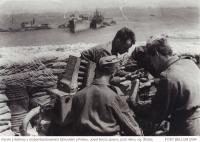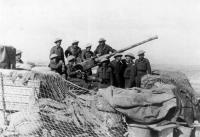Colonel (ret.) Josef Macků
* 1919
-
“There were ten of us going there and they are all dead now. Only me… The rest was people from Baťa who traveled through Turkey… But we were leaving for working positions, I didn’t want to enter the army at first, I was in Holland for a short period of time. I somehow escaped from the country, I thought that Baťa would send me as an accountant to South Africa. All these ten men are dead now, only one that I know, his name is Sejček, he lives in Kadaň. I wanted to go to the air force, where Valčík was, but they found out that my sight was not perfect and they didn’t enroll me. So I stayed an infantry soldier. But I wanted to go to England.”
-
“I would like to tell you that there was also the later general Klapálek among the soldiers who stayed there and who didn’t get to France, he went through several marches when he was trying to escape from the country through Hungary. He came to Palestine and his feet were completely ruined. He found out somehow that I had worked for Baťa and that I could know how to make pedicure. Which was not so… but I had the course. I told him that I had no equipment for that and he obtained that in some Baťa shops and I had to make him a pedicure twice or three times. Once it also happened that when I my platoon was transferred outside Bayreuth, Klapálek’s car came with an order that a certain Macků has to see Klapálek on account of a pedicure.”
-
“We were five children and there was only one of us who could go to study, I didn’t have any other choice than to go to Baťa where most of the people went. It wasn’t very far, just sixty kilometers from home. In 1938 I was sent to Netherlands for a short trip and after a trial period as an accountant I was supposed to study at the business school and later at the academy. In 1939 I was sent to Borov in Yugoslavia where they should have decided where to place me.”
-
“What did those missions look like?” “After dark we set out. We were armed and went up the hills to the Italian frontline. If it was dangerous? We couldn’t get caught. Captivity didn’t exist for us, we knew that we had to end differently than to get captured. Our responsibility was to have a clear view of the Tobruk perimeter because it was the only place that the Germans didn’t siege because they thought that there were strong forces there. So when it was dark we went to the frontline, but then you had to be careful at the daybreak not to be seen in the light. So this is how it was. And that we would fight with a bayonet… it didn’t happen, there wouldn’t be anything left from us.”
-
“As far as I remember, by the time I decided to join the armed forces, I already had my documents ready to be transferred to the Dominican Republic as an accountant. Naturally, I left that aside and I joined the army. In May 1940, we were enrolled at the French consulate in Belgrade, because the Czechoslovak forces were forming in France in Agde. We were warned that after the enrollment to the army we should not walk in the streets too much because there already were German parachute units in Syria and we could be in danger. So we had to escape to Palestine where the English treated us as unknown refugees because the Czechoslovak Republic was not acknowledged. It was called the Assumery, the place where they kept us. They took us to the sea only to have a bath. We didn’t have any right to lead a private life, we were simply refugees. We were supposed to be sailed to France via Greece and Turkey, but Italy had declared war to France and we were stuck in Syria, so out of the thirty men we made a basis of the later Czechoslovak unit, first the 11th Infantry Battalion, then the 200th Anti-aircraft Artillery. That was our rank. We were transferred from the Assumery to an army camp in Gedera, we passed through a heavy training and we were placed into the desert.”
-
Celé nahrávky
-
Praha, 22.10.2008
(audio)
délka: 43:27
Celé nahrávky jsou k dispozici pouze pro přihlášené uživatele.
“We were patriots and we cried for the Republic.”
Josef Macků was born on 26th January 1919 into a farmer‘s family in Svatý Štěpán, a village at the Slovak-Moravian border. The family didn‘t have enough money for all the children to study. Josef was the only one who went to study and work to Zlín at the Baťa company. In 1939 he went for a work trip to Borov in Yugoslavia, where he entered the army through the French consulate in Belgrade. As a volunteer he got through Greece and Turkey to Palestine, where he was enrolled to the British army. From 1940 to 1943 he served in the Middle East where the Czechoslovak forces patrolled and participated in the fights against the French foreign legion. Then, the Czechoslovak forces were transferred to defend the North African port of Tobruk. Then he was transferred to Great Britain where he served in the Czechoslovak infantry. He served as a moto-connection and after a leg injury as a telegraphers‘ instructor. He returned to Czechoslovakia in October 1945 and in January 1946, he was on his own request released from the armed forces (as a colonel). After 1948, as a former soldier, his choice of occupations was limited; apart from other positions, he worked as an accountant in the Průmyslové stavby construction works. Because he spoke foreign languages, mainly English, he was also sent abroad to Syria and Iraq. He lives in Zlín.
He was decorated with: The Czechoslovak War Cross, The 1st Class Medal of Merit, The Memorial Medal 1939-1945, The Africa Star, The 1939-1945 Star and the Polish War Cross

